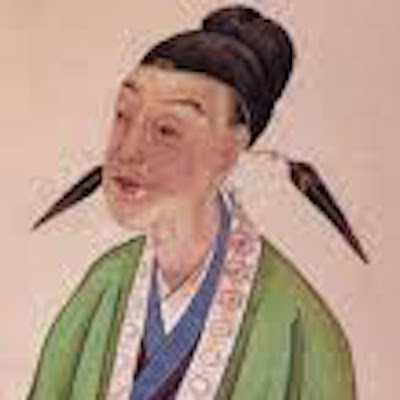While Recovering from a Drinking-Bout in the Elder
Zhang’s House in Lu-zhou, I Sent This Poem to My
Fourteenth Elder Male Cousin through the
Agency of a River Messenger.
By Li He
Translated by Frodsham, J. D.
Only when autumn comes to Zhao-guan,
Will you know how cold it is up here in Zhao.1
I tied this letter to a short-feathered summons,2
Cut out a long screed for a recital of woes.
Through the clear dawn I slumbered in my sickness,
While the sparse plane-trees cast fresh emeralds down.
The city crows cried from white battlements,3
Military bugles saddened the mist in the reeds.4
With turban askew, I lifted the silken curtains,5
In dried-up pools the broken lotus lay.
On the wooden window, traces of silver picture,6
On the stone steps water had left its coins.7
The traveller’s wine caught at my ailing lungs,8
While songs of parting rose from languid strings.
I sealed this poem with a double string of tears,
And culled a single orchid wet with dew.
The sedge is growing old, the cricket weeping,
While broken gargoyles peer from withered pines.9
Waking, I sit astride a horse from Yan,10
Dreaming, I voyage on a boat through Chu.11
Pepper and cinnamon poured above long mats!
Perch and bream sliced upon tortoise-shell!12
Surely you can’t forget the roads leading home,
To spend your youth on river-girdled isles?13
Li He wrote this poem at the end of his life, while he was staying with his friend Zhang Che in Lu-zhou. At this time hostilities had been recommenced against the rebel general, Wang Cheng-zong. This explains the presence of the River Messenger, a military courier who travelled in the region south of the Yangzi bearing urgent messages.
1. Zhao-kuan was in the south, Lu-zhou was up north, in the ancient
territory of Zhao. Hence the marked difference in climate.
2. A traditional name given to urgent military despatches.
3. The battlements were white with mist.
4. A reference to the military situation.
5. His “turban” was a night-cap.
6. “Silver”: perhaps traces of frost. Perhaps the remains of a picture
done with silver paint.
7. “Coins”: round patches of moss, looking like copper coins covered
with verdigris, were growing on the steps of the artificial hill in the
garden.
8. “Traveller’s wine”: the wine he had been drinking while travelling.
9. A little evergreen bush often found growing on the roofs of old
Chinese houses, where it finds a footing in the dirt that accumulates
between the ridge-shaped tiles, is known as “roof-pine.” The
“tile-animals” were highly coloured ceramic beasts placed on roofs
to ward off evil influences.
10. Yan was the old name for the territory in the north next to Zhao. It
was famous for its horses.
11. Zhao-guan was in former Chu territory.
12. Wine flavoured with pepper or cinnamon was a southern delicacy, as were perch and bream (sunfishes).
13. Island in the Yangzi, i.e., in the south. He is half-playfully asking his cousin whether the delights of the south are going to prevent their reunion.
Li He, styled Chang-ji, a native of Fu-chang country, Henan, was born in A.D. 790, the year of the Horse, to a minor branch of the imperial house of Tang. Li He is the bad-boy poet of the late Tang dynasty. He began writing at the age of seven and died at twenty-six from alcoholism or, according to a later commentator, “sexual dissipation,” or both. An obscure and unsuccessful relative of the imperial family, he would set out at dawn on horseback, pause, write a poem, and toss the paper away. A servant boy followed him to collect these scraps in a tapestry bag.
Long considered far too extravagant and weird for Chinese taste, Li He was virtually excluded from the poetic canon until the mid-twentieth century. Today, as the translator and scholar Anne M. Birrell, writes, “Of all the Tang poets, even of all Chinese poets, he best speaks for our disconcerting times.” Modern critics have compared him to Rimbaud, Baudelaire, Keats, and Trakl.
The above one is one of his last verses. Verse of this quality, written when he was only twenty-five or so, makes one realize just how great a loss literature sustained by his untimely death. For at this juncture he was very near the end. We do not know precisely from what disease he was suffering, though repeated references to his emaciated condition in his verse, combined with other symptoms—his prematurely white hair, his fever, and his weakness—would seem to indicate pulmonary tuberculosis.
An ancient source (Yun xian za ji ) carries the story of a visitor who saw our poet “spit on the floor three times”.In any case, the disease that had haunted him for years was now pressing the attack home for the last time. He gave up his post in Lu-zhou and returned to Chang-gu, where he died sometime during the year 816, at the age of 26 or so. He left behind him a corpus of verse which, strangely enough, has not enjoyed widespread popularity in China since the Song dynasty.
What is remarkable aboout his poetry is his anguish, his visionary nihilism, and, above all, his tragic early death (probably from that most romantic illness, tuberculosis. Note the allusion to his lung complaint in the above poem).
Yet Li’s poetry, though it does bear some resemblance to the nineteenth-century decadents and to the work of some difficult modernists, deserves appreciation for its own sake.
Source for the poem and the notes : The Collected Poems of Li He by Frodsham, J. D.Published by The Chinese University of Hong Kong Press

